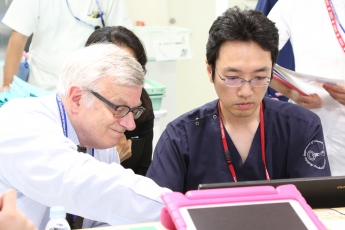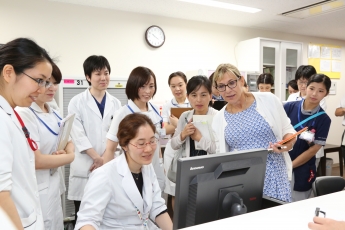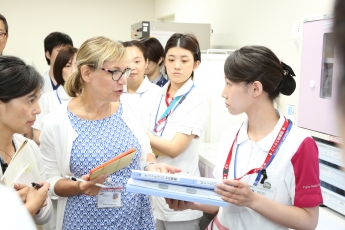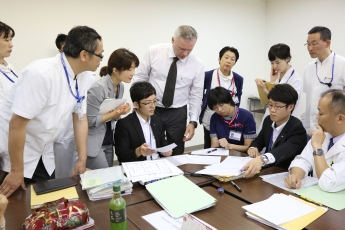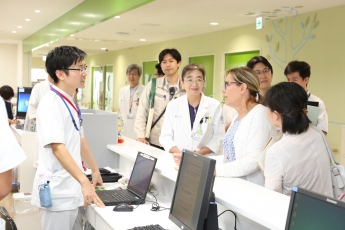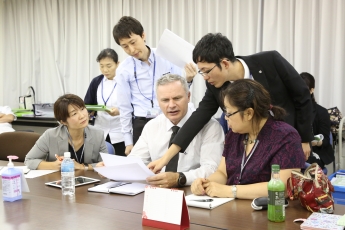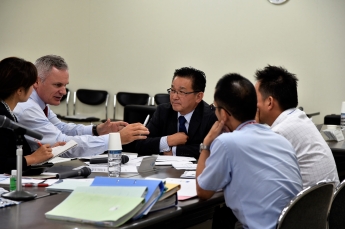Fujita Health University Hospital has been accredited by the JCI for the Academic Medical Center Hospital program
A chronological description of how Fujita Health University Hospital obtained the JCI accreditation

Since its opening in 1973, the Fujita Health University Hospital has upheld its motto “With infinite sympathy for the afflicted, we provide medical care at all times without self-praise or self-satisfaction” and has provided patient-centered medical services. We decided to apply for a JCI accreditation as a benchmark to validate that our services actually fulfill our motto. Thus, we established a JCI project team, which involved the Hospital Director Dr. Yukio Yuzawa as the team leader, to navigate us toward application for the JCI accreditation. It took us approximately 2 years to complete our preparations with hospital-wide collaboration.
The primary objectives of obtaining the accreditation were to enhance our brand image by improving the quality of medical services provided by establishing that our system for enhancing the quality of medical services and ensuring patient safety meets global standard and to provide patient-centered, high-quality services as a globally recognized hospital both within and outside Japan.
Chronological Overview of the JCI Accreditation Application
October 2016: The setting up of a project team led by the Hospital Director, which involved other eight team members
October 2016: Kick-off meeting
November 2017: Mock Assessment 1
February 2018: Mock Assessment 2
July 30, 2018 to August 3, 2018: Final Assessment
1. Working toward improving multiple aspects to ensure safe services.
We reviewed our practice from patient and hospital staff perspectives and worked on various improvements to ensure excellence in medical services on a global standard. Some examples are provided below:
i. To avoid patient duplication, we set a unified rule through which patient identity is confirmed by date of birth or patient card number in addition to their full name (two identifiers are used).
ii. To assist emergency patients to reach the correct destination, we placed red signs, which indicate the direction of the Emergency Outpatient Unit, on the pillars along the external walls at approximately every 10 m.
iii. We enhanced the displays of evacuation routes to enable patients to evacuate calmly in the case of an emergency.
iv. We installed eye-washing devices on each floor to be prepared for scenarios in which drugs or blood splash into the eyes.
v. We integrated the data entry screens and entry items of electronic medical records to efficiently share information among all relevant people at all times.
2. Providing medical services that give patients peace of mind.
As a university hospital with global-level excellence in medical services and hospitality, the Fujita Health University Hospital has always strived to provide state-of-the-art, safe medical services that result in patient satisfaction and fulfill all patient needs. We believe that applying for and obtaining the JCI accreditation will enable us to establish a system to ensure patient safety and enhanced services on a global standard, which would accordingly provide a marked advantage in that we can give patients peace of mind about our medical services.
3. Feeling assured that the JCI accreditation will ensure patient safety and quality medical services.
While preparing for the JCI application, we created several teams for each specialist area, which comprised staff members in various roles, and reviewed the medical service provision system of the hospital. While the staff members usually collaborate with each other within the same role, establishing such teams enabled us to examine issues from various perspectives and improve operations.
Although many staff members were confused at the beginning, we are certain that all the processes have led to ensuring patient safety and the provision of quality medical services.
What is JCI?
The Joint Commission International (JCI) is an organization that assesses the quality of medical services and patient safety in the international community. The JCI was founded in 1994 based on the Joint Commission (JC), a US-based accreditation organization for healthcare organizations.
At present, the JCI accredits organizations through the following eight programs: hospitals; academic medical center hospitals; ambulatory care; laboratory; home care; long-term care; medical transport organizations; and primary care centers.
The JCI Academic Medical Center Hospital Accreditation Program
The JCI accreditation criteria are categorized into the following hospital programs: Patient-Centered Standards; Health Care Organization Management Standards; and Academic Medical Center Hospital Standards, which include specialist medical education and clinical research. The criteria for these programs are further subdivided into 16 areas, within which the applicant organization will be assessed against 1270 items. Medical organizations that satisfy the accreditation criteria are recognized as ensuring high-quality medical services and patient safety on a global standard. Accredited organizations are required to continue further improvement, and the accreditation might be renewed for another 3-year accreditation period subject to a revalidation process.
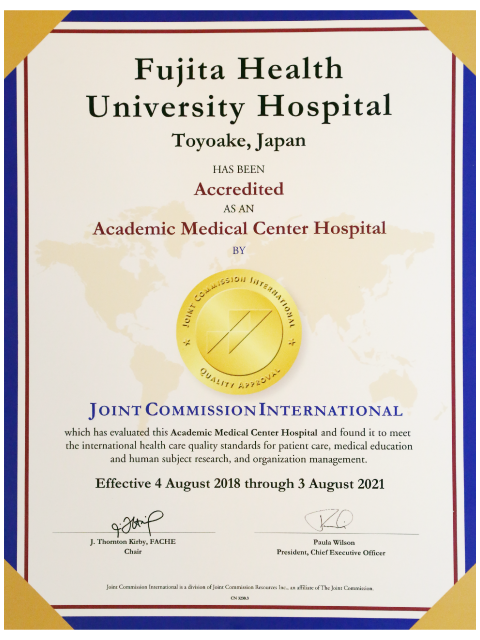
Patient-Centered Standards (663 items)
1. International Patient Safety Goals (IPSG)
2. Access to Care and Continuity of Care (ACC)
3. Patient and Family Rights (PFR)
4. Assessment of Patients (AOP)
5. Care of Patients (Treatment) (COP)
6. Anesthesia and Surgical Care (ASC)
7. Medication Management and Use (MMU)
8. Patient and Family Education (PFE)
Health Care Organization Management Standards (536 items)
9. Quality Improvement and Patient Safety (QPS)
10. Prevention and Control of Infections (PCI)
11. Governance, Leadership, and Direction (GLD)
12. Facility Management and Safety (FMS)
13. Staff Qualifications and Education (SQE)
14. Management of Information (MOI)
Academic Medical Center Hospital (Special Function Hospital) Standards (71 items)
15. Medical Professional Education (MPE)
16. Human Subjects Research Programs (including clinical trials) (HRP)

